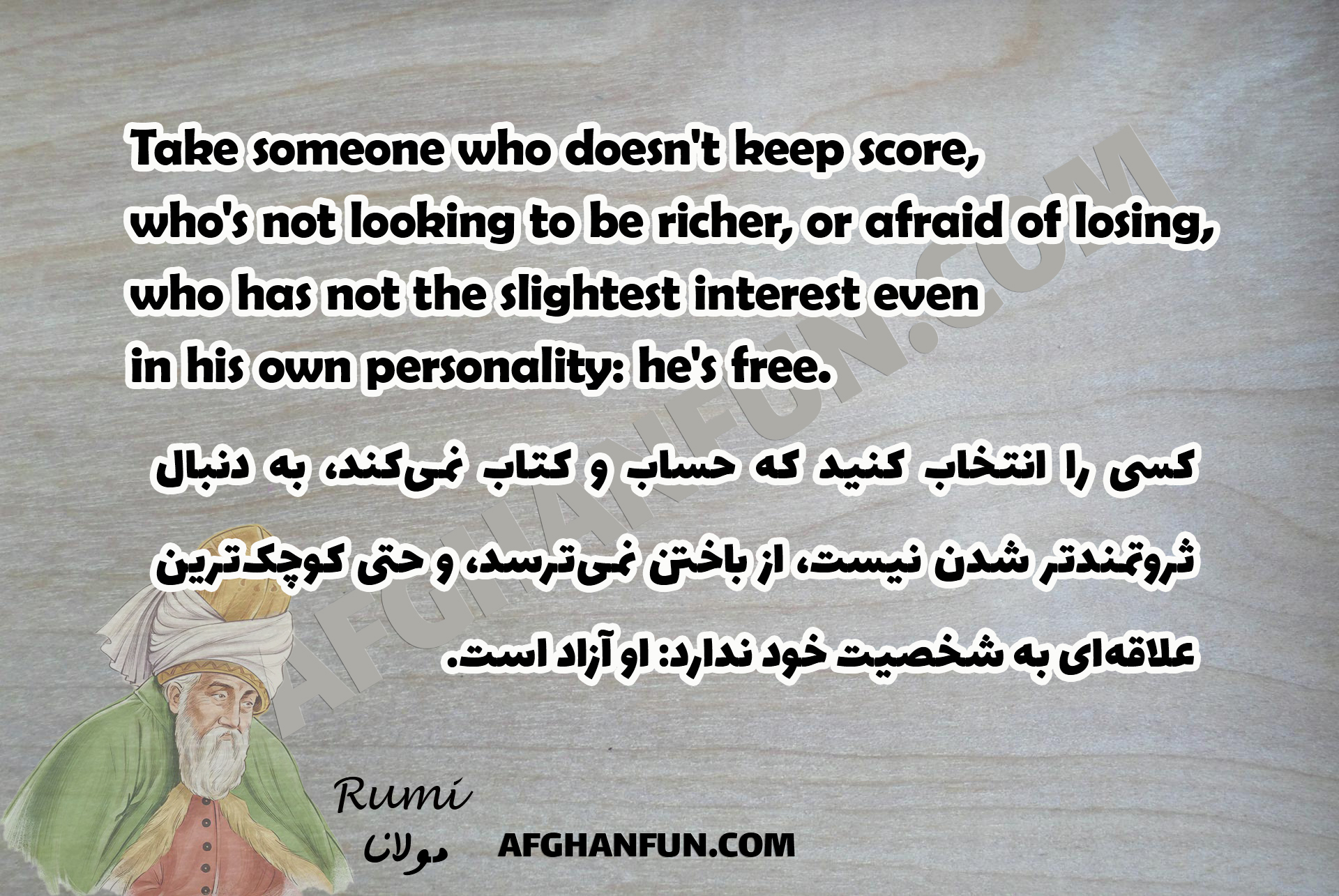Rumi’s Quote on Freedom: The Secret to Living Without Fear or Ego
Take someone who doesn’t keep score,
Rumi
who’s not looking to be richer, or afraid of losing,
who has not the slightest interest even
in his own personality: he’s free.
Rumi’s Wisdom: How to Live Without Fear or Desire
کسی را انتخاب کنید که حساب و کتاب نمیکند، به دنبال ثروتمندتر شدن نیست، از باختن نمیترسد، و حتی کوچکترین علاقهای به شخصیت خود ندارد: او آزاد است.
مولانا
این متن به آزادی واقعی اشاره دارد که از رهایی از تمام وابستگیها، ترسها و خودخواهیها حاصل میشود. منظور این است که وقتی فردی به مادیات، مقایسهها، یا حتی به خودِ شخصیاش وابسته نباشد، از بند دغدغهها آزاد میشود. چنین فردی نه از دست دادن چیزی میترسد و نه در پی به دست آوردن چیزی است؛ بلکه در آرامش و آزادی درونی زندگی میکند.
Rumi’s Lesson on Freedom: Why Keeping Score Holds You Back
Касеро интихоб кунед, ки ҳисобу китоб намекунад, ба дунболи бойтар шудан нест, аз бохт намеҳаросад ва ҳатто ба шахсияти худ камтарин шавқе надорад: ӯ озод аст.
МАВЛОНО ҶАЛОЛУДДИН МУҲАММАДИ БАЛХӢ
Ин матн ба озодии ҳақиқӣ ишора мекунад, ки аз озод шудан аз ҳама вобастагиҳо, тарсҳо ва худхоҳӣ ба даст меояд. Маънои он аст, ки вақте инсон ба моддиёт, муқоисаҳо ва ҳатто ба худи шахсияти худ вобаста нест, аз банди ташвишҳо озод мешавад. Чунин шахс на аз даст додани чизе метарсад ва на дар пайи ба даст овардани чизе аст; балки дар оромиш ва озодии ботинӣ зиндагӣ мекунад.
Rumi’s Guide to Freedom: Letting Go of Material Desires
اختر شخصًا لا يحسب الأمور، ولا يسعى ليصبح أغنى، ولا يخشى الخسارة، ولا يولي أدنى اهتمام لشخصيته: فهو حر.
مولانا جلال الدین محمد الرومي
يشير هذا النص إلى الحرية الحقيقية التي تنبع من التحرر من كل التعلقات والمخاوف والأنانية. المعنى هنا أن الشخص الذي لا يتعلق بالماديات، أو بالمقارنات، أو حتى بشخصيته، يصبح حراً من قيود القلق. مثل هذا الإنسان لا يخاف فقدان شيء، ولا يسعى وراء امتلاك شيء، بل يعيش في سلام داخلي وحرية تامة.
This quote by Rumi invites deep reflection on the nature of freedom and the qualities that define a truly liberated person. Let’s break it down step by step:
“Take someone who doesn’t keep score”
The phrase “doesn’t keep score” suggests that the person does not measure their actions in terms of gains and losses, rewards and punishments, or comparisons with others. Keeping score often implies a transactional mindset—an attitude where everything is weighed against some kind of personal benefit or return. By not keeping score, this person is freed from the pressures of competition, comparison, or the need to prove themselves. They are not constantly looking for validation, nor are they tallying up favors or deeds in the way that many people do.
This person embodies a sense of selflessness, where actions are not motivated by personal gain but by a deeper, intrinsic sense of rightness or connection.
“Who’s not looking to be richer, or afraid of losing”
This part emphasizes a release from materialism, ambition, and fear—two emotions often intertwined in the human pursuit of wealth or success. “Not looking to be richer” refers not only to financial wealth but to an attitude of greed, accumulation, and desire for more, which can dominate one’s life. The person described is not driven by the need to acquire more, whether it’s physical possessions, power, status, or approval.
On the other hand, “not afraid of losing” highlights the absence of fear—fear of loss, fear of failure, fear of death, or the fear of not having enough. Fear of loss often leads to anxiety and the need to control outcomes, but the person Rumi speaks of is unburdened by this fear. They are not caught up in the potential future scenarios of scarcity or defeat, which can chain people to unhealthy patterns of behavior and mindset. The one who is not afraid of losing is free because they have transcended the attachment to results, outcomes, and material security.
“Who has not the slightest interest even in his own personality”
This line may be the most profound in terms of spiritual freedom. Rumi is pointing toward the transcendence of the ego—the “personality” here refers to the constructed self, the persona we build based on social roles, personal identity, and societal expectations. Many people spend their lives trying to defend, protect, or project their personality, but Rumi suggests that true freedom comes when one is no longer attached to this identity.
The person described in the quote has moved beyond the need to define themselves by their personality traits, social image, or external validation. They have transcended the ego’s need to assert itself and are at peace with the ever-changing, impermanent nature of the self. By being free of attachment to the ego, this person is liberated from the anxieties that come with maintaining a sense of self in the world.
“He’s free.”
The conclusion of the quote is simple yet powerful. The person who no longer keeps score, who is not driven by wealth or fear of loss, and who is not concerned with maintaining a fixed personality—this person is truly free. Rumi’s definition of freedom is not about external circumstances (such as wealth, status, or control) but about inner liberation from desires, fears, and the ego. This freedom is deeply spiritual—freedom from the mind’s attachments and illusions, from the tyranny of the “self” that constantly seeks validation and security.
In essence, Rumi is describing a state of inner freedom, which comes from living without attachment to the fleeting things of the world. It’s a state where the individual is not defined by external possessions, achievements, or even the concept of self. This kind of freedom aligns with a higher state of consciousness, often associated with spiritual enlightenment or awakening, where one is in harmony with the flow of life and no longer bound by the false distinctions of “self” and “other.”
The Key Themes
- Non-attachment: The freedom from attachment to material possessions, fear of loss, and the ego’s constructed personality.
- Selflessness: Living without the constant drive for self-interest, personal gain, or comparison.
- Fearlessness: The release of fears—whether of losing, of failure, or of death—that keep us bound to a limited, reactive state.
- Spiritual Liberation: The idea of transcending the ego and the mind’s constant need for security, validation, and distinction.
Implications for Practice
For those who seek a deeper sense of freedom or spiritual liberation, Rumi’s words point toward practices that lead to letting go of attachments—whether to possessions, outcomes, or identity. This may involve cultivating mindfulness, engaging in meditation, practicing generosity, or embracing a path of selfless service.
Ultimately, the path Rumi describes is one of profound simplicity and peace, where one’s life is no longer defined by the constant struggle for more, nor by the fear of loss, but by a deep acceptance of what is, and a freedom that arises from within.
External links:
This Rumi quote, found on “Goodreads“











